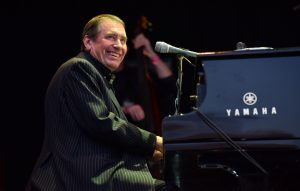Student: I aspire to be an artist-producer. How realistic is it to be able to balance producing for others while maintaining your own performing artist career?
Nuel Always Cho: I think that depends on personality. You have to figure out what you want, just like you have to figure out your voice and sound. If you want it, you will figure out the time to do it, when do you prefer producing, and when do you want to perform there are a lot of artists who have done both. Some artists go back and forth between producing and performing. Your primary concern is going to be scheduling. To be a performing artist you have to put in a touring schedule. To be a producer you have to do a recording schedule. How do you balance that? I think it is a personal question.
Toki Wright (Host): How does “Whose paying me?” fit into that equation?
Michael McCall: To be honest with you, it might seem negative, I would rather see someone not start as a jack of all trades, but rather a master of one. It is a competitive industry and it’s not easy and it takes a long time just to do one thing. You could produce for yourself, get your There’s just not enough hours in the day to do that in the beginning. To play devil’s advocate you can do what you want, it’s music you can break the rules. I just think it’s easier to compartmentalize in your brain, like just producing for the next two years or just artist stuff for the next few years. Just put those horse blinders on and only do that and then when you feel like you did that for enough time, you can transition. I’ve seen that work better than putting then trying to do it all and putting 30% effort into each category, it just takes longer to get to 100%
Student: What are the key differences between labels in Korea and here in terms of operations?
Nuel Always Cho: Our entertainment industry is so young. The labels there are doing so well with singular artists selling CD/compact discs still in 2023. They only have to focus on units sold versus units returned. which is how a lot of labels functioned in America, during the 70s and 80s like Motown Records. They don’t have a deep analysis department at Korean labels, unfortunately. American labels are very data-based. They do at the bigger labels, but they only get their data when they make decisions.
Student: Is there a tendency to have those now?
Nuel Always Cho: American labels are very data-focused. Korean labels still have a lot of the traditional departments like marketing, publicity, hair, makeup, and everything. Wardrobe is probably way more intense than in America actually, because they always have members. It’s a lot of gigs, but it’s a little more old school, you have to go there a put in your labor too.
Student: What do you think the American industry can learn from the K-pop industry?
Michael McCall: How to develop an artist. How to care about music. Put time in.
Nuel Always Cho: Not signing artists from TikTok, Instagram, or Twitter, and developing them as the real definition of an artist.
Michael McCall: When he says data-driven, like its data-driven, like Republic Records is legitimately looking at a sheet, and if you are in the red for too long – I don’t care if you are selling out stadiums or you’re selling out clubs with solid fans and 5 million monthlies (streams) you’re still getting dropped because you’re in the red 2 million. They don’t care how you just need one song to make that 2 million back with the one song. They can have a forecasting team come in a say you need to drop “this one, this one and this one” I’ve seen it done.
Toki Wright (Host): What can Berklee do to better prepare students for K-pop culture?
Nuel Always Cho: Trips and exchange programs with schools in Korea. You have to be there on the spot, it always helps. I loved hip-hop growing up in Seoul, if I hadn’t lived in New York and gotten right into the grind of the streets. I don’t think I would have understood the culture.
Michael McCall: I think classes that actually learn about the music (K-pop) and more about the culture to get a better appreciation of the landscape. Not just be like oh cool another place to make money and get cuts. I think more of an approach to that first. More classes specific to K-pop style writing.
Andrew Choi: A program that teaches K-pop music history, as far as the 1950’s and 60’s. Korean music was on par with Western music before the war, but it got lost. So after the war, Korea became a poverty-stricken country. So we didn’t have the luxury to expand on that art. So all that progression of music got lost after the war. So you have to check out some of the music from back them. They were amazing, some were as good as the Beatles, I would say, they were incredible. So I believe including a program like that would inspire young songwriters and help them understand how far K-pop music has come.
For more information about future events visit. https://www.kpopandbeyond.net/



